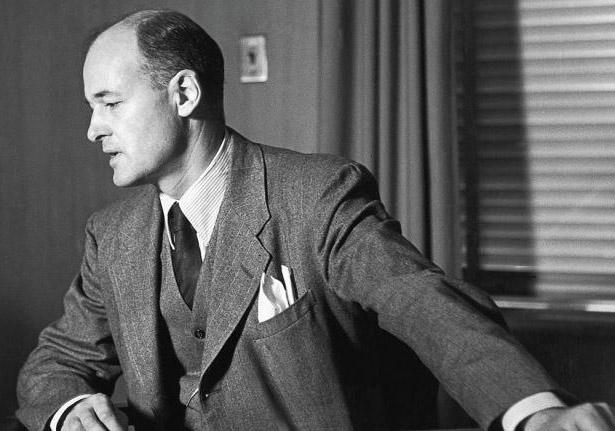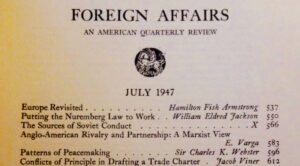Long Telegram (February 22, 1946)
To Secretary of State. Washington. February 22, 9pm
“I apologize in advance for this burdening of telegraphic channel; but questions involved are of such urgent importance, particularly in view of recent events, that our answers to them, if they deserve attention at all, seem to me to deserve it at once.”
(One) Basic features of post-war Soviet outlook.
“USSR still lives in antagonistic “capitalist encirclement” with which in the long run there can be no permanent peaceful coexistence.”
(Two) Background of this outlook
“please note that premises on which this party line is based are for most part simply not true. Experience has shown that peaceful and mutually profitable coexistence of capitalist and socialist states is entirely possible.”
“At bottom of Kremlin’s neurotic view of world affairs is traditional and instinctive Russian sense of insecurity. Originally, this was insecurity of a peaceful agricultural people trying to live on vast exposed plain in neighborhood of fierce nomadic peoples. To this was added, as Russia came into contact with economically advanced West, fear of more competent, more powerful, more highly organized societies in that area.”
(Three) Its projection in practical policy on official level.
“Toward colonial areas and backward or dependent peoples, Soviet policy, even on official plane, will be directed toward weakening of power and influence and contacts of advanced Western nations, on theory that in so far as this policy is successful, there will be created a vacuum which will favor Communist-Soviet penetration.”
(Four) Its projection on unofficial level.
“Only in certain countries where communists are numerically strong do they now regularly appear and act as a body. As a rule they are used to penetrate, and to influence or dominate, as case may be, other organizations less likely to be suspected of being tools of Soviet Government, with a view to accomplishing their purposes through [apparent omission] organizations, rather than by direct action as a separate political party….A wide variety of national associations or bodies which can be dominated or influenced by such penetration. These include: labor unions, youth leagues, women’s organizations, racial societies, religious societies, social organizations, cultural groups, liberal magazines, publishing houses, etc.”
(Five) Practical deductions from standpoint of US policy.
“In summary, we have here a political force committed fanatically to the belief that with US there can be no permanent modus vivendi that it is desirable and necessary that the internal harmony of our society be disrupted, our traditional way of life be destroyed, the international authority of our state be broken, if Soviet power is to be secure. This political force has complete power of disposition over energies of one of world’s greatest peoples and resources of world’s richest national territory, and is borne along by deep and powerful currents of Russian nationalism. In addition, it has an elaborate and far flung apparatus for exertion of its influence in other countries, an apparatus of amazing flexibility and versatility, managed by people whose experience and skill in underground methods are presumably without parallel in history.”
“Finally we must have courage and self-confidence to cling to our own methods and conceptions of human society. After all, the greatest danger that can befall us in coping with this problem of Soviet communism, is that we shall allow ourselves to become like those with whom we are coping.”
KENNAN
Sources of Soviet Conduct (1947)
“The political personality of Soviet power as we know it to day is the product of ideology and circumstances: ideology inherited by the present Soviet leaders from the movement in which they had their political origin, and circumstances of the power which they now have exercised for nearly three decades in Russia. There can be few tasks of psychological analysis more difficult than to try to trace the interaction of these two forces and the relative role of each in the determination of official Soviet conduct.” (p. 566)
ANALYZING SOVIET POWER
“Now the maintenance of this pattern of Soviet power, namely, the pursuit of unlimited authority domestically, accompanied by the cultivation of the semi-myth of implacable foreign hostility, has gone far to shape the actual machinery of Soviet power as we know it today. Internal organs of administration which did not serve this purpose withered on the vine. Organs which did serve this purpose became vastly swollen. The security of Soviet power came to rest on the iron discipline of the Party, on the severity and ubiquity of the secret police, and on the uncompromising economic monopolism of the state.” (p. 571)
A LONG-TERM PROBLEM BUT SHORT-TERM OPPORUNITIES
“This means that we are going to continue for a long time to find the Russians difficult to deal with. It does not mean that they should be considered as embarked upon a do-or-die program to overthrow our society by a given date. The theory of the inevitability of the eventual fall of capitalism has the fortunate connotation that there is no hurry about it.” (p. 572)
“This means that truth is not a constant but is actually created, for all intents and purposes, by the Soviet leaders themselves. It may vary from week to week, from month to month. It is nothing absolute and immutable –nothing which flows from objective reality.” (p. 573)
From Ainsley McCaa’s student project on Kennan
“These considerations make Soviet diplomacy at once easier and more difficult to deal with than the diplomacy of individual aggressive leaders like Napoleon and Hitler. On the one hand it is more sensitive to contrary force, more ready to yield on individual sectors of the diplomatic front when that force is felt to be too strong, and thus more rational in the logic and rhetoric of power. On the other hand it cannot be easily defeated or discouraged by a single victory on the part of its opponents.” (p. 575)
“In these circumstances it is clear that the main element of any United States policy toward the Soviet Union must be that of a long-term, patient but firm and vigilant containment of Russian expansive tendencies.” (p. 575)
END OF PARTNERSHIP
“It is clear that the United States cannot expect in the foreseeable future to enjoy political intimacy with the Soviet regime. It must continue to regard the Soviet Union as a rival, not a partner, in the political arena.” (p. 580)
A WARNING FOR AMERICA’S FUTURE
“The issue of Soviet-American relations is in essence a test of the over-all worth of the United States as a nation among nations. To avoid destruction the United States need only measure up to its own best traditions and prove itself worthy of preservation as a great nation.” (p. 582)


